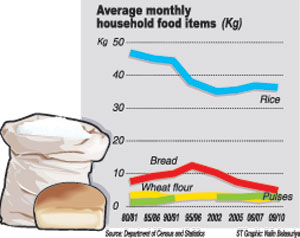The increase in the price of bread is prompting people to consume less bread, leaving bakery owners in a dilemma, the Sunday Times learns.
All Ceylon Bakery Owner’s Association President N.K. Jayawardena told the Sunday Times the price increase had affected their businesses badly and many small-time bakeries were running at a loss. He said if an immediate solution was not found to the crisis, the entire industry would collapse.
 |
| While some bakers suffer or cushion the loss, others go for low quality wheat flour. Pix by Hasitha Kulasekera |
|
Mr. Jayawardena said the price increase had apparently prompted people to go for alternatives and some bakery owners in rural areas had stopped producing other flour-based products because they could not sell them.
The drop in bread and other bakery product sales has also hit not only wheat flour suppliers but also other businesses such as farms and companies that import machinery and ingredients for bakery products, the Sunday Times learns.
Mr. Jayawardena warned that if the crisis continued, small-time bakery owners would have to retrench their workforce to survive in the trade. He said a bakery owner paid a minimum salary of Rs. 20,000 to an employee in addition to providing him with food and accommodation.
The depreciation of the rupee, the massive surcharge on electricity bills, increased rents and the rising cost of labour in addition to all sorts of taxes such as the VAT, the income tax and NBT are adding to the woes of the bakers, the bakery owners’ union chief said.
He said bakery owners could minimise the loss if they added rice flour to the wheat-flour dough. This could help benefit rice farmers who are struggling to sell their produce.
Mohamed Malik, a small-time bakery owner in Wattala, said his sales had dropped drastically after the recent bread price increase and to attract customers he had not raised the price of other flour-based products.
 |
 |
| All Ceylon Bakery Owner’s Association President, N.K. Jayawardena |
A. Nimal, a
private sector
employee |
L. Chanaka, who sells bread in his grocery in Maradana, said not many consumers were interested in buying bread or other bakery products these days. He also attributed the change in consumer behaviour to the high price.
“Now I can’t sell even 30 loaves of bread,” he said.
While some bakers suffer or cushion the loss, the Sunday Times learns others go for low quality wheat flour.
Stressing the importance of maintaining the quality of bread, the Health Ministry’s Food Control Assistant Director, H. Tilakarathna, said talks were being held with bakery owners to persuade them to provide quality and nutritious products to consumers.
Tampering with the quality may cause health problems, he warned.
According to regulations governing food, a loaf of bread should contain 40 per cent or less moisture and weigh around 450 grams while its interior should be fluffy, not gummy.
If a baker does not conform to the regulations, consumer can complain to Public Health Inspectors who will take action under the Food Act against errant bakers.
Several consumers said they were forced to look for alternatives such as rice and pulses in view of the bread price increase.
Working people, especially middle class parents who were in a race against time in the morning attending to the needs of their school-going children said bread was a more convenient breakfast, but they were now going for alternatives.
A. Nimal, a private sector employee said: “My family is more in to rice than bread after the bread price increase,” he said adding that it was a way of coping with the rising cost of living.
But three-wheeler driver Lal from Maligawatta said his family ate bread in the morning as they had no replacement for bread.
“We eat bread to live, nothing else,” he said.
Health conscious people, meanwhile, said they had cut down on their bread consumption because the sugar content in wheat-flour-based products was high. |





